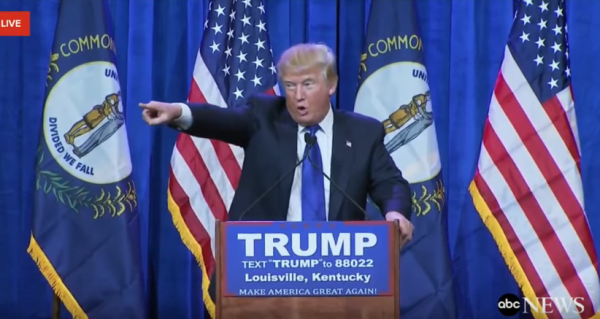Trump Defeats 'Incitement' Claims for Campaign Rally Speech
"Trump's speech enjoys First Amendment protection, because he did not specifically advocate imminent lawless action," the U.S. Court of Appeals for the Sixth Circuit said Tuesday.
September 11, 2018 at 02:07 PM
4 minute read
 A Trump campaign rally in 2016 in Kentucky. Screenshot from YouTube.
A Trump campaign rally in 2016 in Kentucky. Screenshot from YouTube.
Updated at 3:53 p.m.
In a significant victory for President Donald Trump, a federal appeals court on Tuesday ruled that Trump's “get 'em out of here” appeal to his supporters to eject protesters from a rally in Kentucky in 2016 was protected by the First Amendment's free speech clause.
A three-judge panel of the U.S. Court of Appeals for the Sixth Circuit, noting that Trump also said “don't hurt 'em,” found that the president “did not specifically advocate imminent lawless action,” and therefore did not violate a state law barring incitement to riot.
The case was Nwanguma v. Trump and the judges on the panel were David McKeague, Richard Griffin and Helene White, all appointed by President George W. Bush.
Jones Day partner Michael Carvin represented Trump in the case, arguing that “punishing Mr. Trump for calling for the expulsion of disruptive protesters from his campaign rally would be a severe infringement on his First Amendment rights.”
During the event in Louisville on March 1, 2016, protesters displayed anti-Trump signs, interrupting his campaign speech several times. Each time, Trump said, “Get 'em out of here,” or “Get out of here,” according to briefs filed in the case.
At one point, Trump also said, “Don't hurt 'em. If I say 'go get 'em,' I get in trouble with the press, the most dishonest human beings in the world.”
The appeals court ruling asserted that even if Trump had only said “get 'em out of here,” that might be construed as “implicitly encouraging unwanted physical touching,” but not incitement to riot.
“The notion that Trump's direction to remove a handful of disruptive protesters from among hundreds or thousands in attendance could be deemed to implicitly incite a riot is simply not plausible,” McKeague wrote.
The court cited the landmark 1969 U.S. Supreme Court decision Brandenburg v. Ohio, which established that the First Amendment protects speech advocating the use of force, except when it is aimed at “inciting or producing imminent lawless action.”
But because Trump “did not specifically advocate for listeners to take unlawful action,” the appeals panel stated that his remarks “are not up to the task demanded by Brandenburg.”
In a concurring opinion, White agreed with the outcome but said the decision “overemphasizes the legal significance of the 'don't hurt 'em' statement,” and should not have reached the First Amendment issue when the case could be decided on Kentucky law.
Louisville lawyer Daniel Canon, who argued for the ejected protesters, said they will seek further review.
“Mr. Trump, throughout his campaign, intentionally used crowd violence to suppress dissident speech—the kind of core speech that the First Amendment traditionally protects,” Canon said in a statement. “The court's opinion today gives him a free pass for that conduct, even though he had publicly been asking for violence to occur at these rallies for months, and even though his co-defendants have said they would not have attacked our clients if Trump had not directed them to do so.”
Cannon added: “Allowing a candidate for public office to use the First Amendment as a shield under these circumstances is unprecedented and dangerous.”
The Sixth Circuit ruling is posted below:
Read more:
Supreme Court Isn't on Trump's Side as He Bashes Media
New Book Tells Inside Stories of Feuding Justices, Anger Toward Trump
Potential Blockbuster Horizon Could Reshape Church-State Doctrine
Can Michael Cohen Say No to a Presidential Pardon?
Marketing Analyst Who Gave Trump the Finger Loses Suit Over Her Firing
This content has been archived. It is available through our partners, LexisNexis® and Bloomberg Law.
To view this content, please continue to their sites.
Not a Lexis Subscriber?
Subscribe Now
Not a Bloomberg Law Subscriber?
Subscribe Now
NOT FOR REPRINT
© 2025 ALM Global, LLC, All Rights Reserved. Request academic re-use from www.copyright.com. All other uses, submit a request to [email protected]. For more information visit Asset & Logo Licensing.
You Might Like
View All
Weil Adds Acting Director of SEC Enforcement, Continuing Government Hiring Streak
3 minute read

Law Firms Expand Scope of Immigration Expertise Amid Blitz of Trump Orders
6 minute readTrending Stories
- 1'Lookback Window' Law for Child Abuse Cases Constitutional, State High Court Finds
- 2Troutman Pepper Says Ex-Associate Who Alleged Racial Discrimination Lost Job Because of Failure to Improve
- 3Texas Bankruptcy Judge Withdraws Ethics Complaint Against Jackson Walker
- 4Apply Now: Superior Court Judge Sought for Mountain Judicial Circuit Bench
- 5Harrisburg Jury Hands Up $1.5M Verdict to Teen Struck by Underinsured Driver
Who Got The Work
J. Brugh Lower of Gibbons has entered an appearance for industrial equipment supplier Devco Corporation in a pending trademark infringement lawsuit. The suit, accusing the defendant of selling knock-off Graco products, was filed Dec. 18 in New Jersey District Court by Rivkin Radler on behalf of Graco Inc. and Graco Minnesota. The case, assigned to U.S. District Judge Zahid N. Quraishi, is 3:24-cv-11294, Graco Inc. et al v. Devco Corporation.
Who Got The Work
Rebecca Maller-Stein and Kent A. Yalowitz of Arnold & Porter Kaye Scholer have entered their appearances for Hanaco Venture Capital and its executives, Lior Prosor and David Frankel, in a pending securities lawsuit. The action, filed on Dec. 24 in New York Southern District Court by Zell, Aron & Co. on behalf of Goldeneye Advisors, accuses the defendants of negligently and fraudulently managing the plaintiff's $1 million investment. The case, assigned to U.S. District Judge Vernon S. Broderick, is 1:24-cv-09918, Goldeneye Advisors, LLC v. Hanaco Venture Capital, Ltd. et al.
Who Got The Work
Attorneys from A&O Shearman has stepped in as defense counsel for Toronto-Dominion Bank and other defendants in a pending securities class action. The suit, filed Dec. 11 in New York Southern District Court by Bleichmar Fonti & Auld, accuses the defendants of concealing the bank's 'pervasive' deficiencies in regards to its compliance with the Bank Secrecy Act and the quality of its anti-money laundering controls. The case, assigned to U.S. District Judge Arun Subramanian, is 1:24-cv-09445, Gonzalez v. The Toronto-Dominion Bank et al.
Who Got The Work
Crown Castle International, a Pennsylvania company providing shared communications infrastructure, has turned to Luke D. Wolf of Gordon Rees Scully Mansukhani to fend off a pending breach-of-contract lawsuit. The court action, filed Nov. 25 in Michigan Eastern District Court by Hooper Hathaway PC on behalf of The Town Residences LLC, accuses Crown Castle of failing to transfer approximately $30,000 in utility payments from T-Mobile in breach of a roof-top lease and assignment agreement. The case, assigned to U.S. District Judge Susan K. Declercq, is 2:24-cv-13131, The Town Residences LLC v. T-Mobile US, Inc. et al.
Who Got The Work
Wilfred P. Coronato and Daniel M. Schwartz of McCarter & English have stepped in as defense counsel to Electrolux Home Products Inc. in a pending product liability lawsuit. The court action, filed Nov. 26 in New York Eastern District Court by Poulos Lopiccolo PC and Nagel Rice LLP on behalf of David Stern, alleges that the defendant's refrigerators’ drawers and shelving repeatedly break and fall apart within months after purchase. The case, assigned to U.S. District Judge Joan M. Azrack, is 2:24-cv-08204, Stern v. Electrolux Home Products, Inc.
Featured Firms
Law Offices of Gary Martin Hays & Associates, P.C.
(470) 294-1674
Law Offices of Mark E. Salomone
(857) 444-6468
Smith & Hassler
(713) 739-1250









